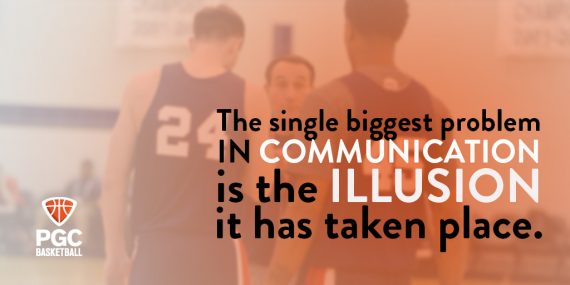An Obvious Difference between Good Players and Mediocre Players

“I’ve got that man.”
“Take ’im!”
“Get through.”
“Help here.”
“Bring ’im here.”
“Go through.”
“Watch behind.”
Talking to teammates, helping each other verbally, is one of the most obvious differences between good players and mediocre ones on the court.
There are dozens of comments that get repeated over and over in games, and they do help a team perform better. Just getting in the habit of calling out your man each time on defense, and getting your teammates to call out theirs, will end up saving baskets over the course of a game and season.
Talking your teammates through screens, telling them when you are in good help-position ready to pick up their men, motioning for them to clear out or cut through the lane, alerting them to cutters or players trying to sneak behind your defense—all of these and many more situations happen often in games.
If you are not in the habit of constantly talking during the action of the game, you may be surprised at how often your words can help your teammates make a play.
Less-experienced players tend to think that many of these situations are obvious. (“It was clear there was a screen there. Why should I bother to tell him?” Or “It was clear I had that man and he had the other man, so how could it help just saying what was already obviously going to happen?”) They don’t bother to say anything. But these situations are not always obvious. Talking is very often what makes them obvious. Talking ends any possible confusion that may arise. And talking prevents the short hesitations (Is he thinking what I’m thinking? Should I take that man, or shouldn’t I?) that frequently are all that a team needs to get the slight advantage necessary to score.
Talking helps a team coordinate its activities, assures that everyone is working together and encourages players to do decisively what they otherwise may do haphazardly or a second too late.
Talking, even saying the obvious, helps you win games. Join us at a PGC camp where you’ll learn how the best guards in the world read and react to every in-game scenario and become the leader every coach wants to have on their team.
Related Articles
A Leadership Lesson Most Never Get
If there is one crucial concept that is important to living well, it’s learning to live between your own ears.
4 Reasons You Can’t Be a “Shy Leader”
If you only lead by example, you’re a poor leader.
Think the Game Thursday: Communication the Duke Way
Tyler Coston shares three key ingredients that make Duke basketball the standard for championship-level communication in any sport. Join us to propel your game forward.
About PGC
PGC Basketball provides intense, no-nonsense basketball training for players and coaches. Our basketball camps are designed to teach players of all positions to play smart basketball, be coaches on the court, and be leaders in practices, games and in everyday life.
We combine our unique PGC culture with a variety of teaching methods and learning environments to maximize the learning potential of those that attend our sessions. In addition to spending 6-7 hours on the court each day, lessons will be reinforced through classroom sessions and video analysis.
Our goal at PGC is to empower you with the tools to fulfill your basketball dreams, while also assisting you in experiencing the joy of the journey.
To learn more about PGC Basketball, including additional basketball training tips and videos, visit our YouTube Channel or find us on Facebook, Instagram, and Twitter.













Share This Post